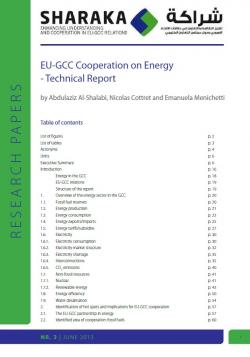EU-GCC Cooperation on Energy. Technical Report
Energy remains central to EU-GCC relation. Fossil fuels are the most traded product between the two regions due to proximity and the complementarities of their energy production and consumption patterns. Having a third of the world's oil reserves, GCC countries have paid only limited attention to their domestic energy consumption. However, the rising cost of electricity production and the relative shortage in gas production are changing the governments' strategies: they tend today to recognise the importance of diversifying local energy supplies and are moving towards market reform and a sustainable energy mix. The Joint Action Program between the EU and the GCC, launched in 2010, pays particular attention to renewable energy following the idea of energy diversification encouraging GCC countries to step forward in alternative energy and energy efficiency options. Renewable energy and energy efficiency thus present excellent opportunities for EU-GCC cooperation and partnership. This report aims to identify such opportunities in the field of energy, which is tightly linked to environmental and climate change issues. The report written by the OME research team is based on the analysis of primary and secondary data emerging from the contributions and knowledge of European and GCC stakeholders.
-
Dati bibliografici
Roma, Istituto affari internazionali, 2013, 84 p. -
In:
-
Numero
Research Paper 3
List of figures
List of tables
Acronyms
Units
Executive Summary
Introduction
Energy in the GCC
EU-GCC relations
Structure of the report
1. Overview of the energy sector in the GCC
1.1. Fossil fuel reserves
1.2. Energy production
1.3. Energy consumption
1.4. Energy exports/imports
1.5. Energy tariffs/subsidies
1.6. Electricity
1.6.1. Electricity consumption
1.6.2. Electricity market structure
1.6.3. Electricity shortage
1.6.4. Interconnections
1.6.5. CO2 emissions
1.7. Non-fossil resources
1.7.1. Nuclear
1.7.2. Renewable energy
1.8. Energy efficiency
1.9. Water desalination
2. Identification of hot spots and implications for EU-GCC cooperation
2.1. The EU-GCC partnership in energy
2.2. Identified area of cooperation: fossil fuels
2.3. Identified area of cooperation: electricity
2.4. Identified area of cooperation: nuclear
2.5. Identified area of cooperation: renewable energy
2.6. Identified area of cooperation: energy efficiency
2.7. Identified area of cooperation: water
Conclusion
References
Annex 1. Key indicators and compound indicators for GCC countries, EU-27 and the world (2009)
Annex 2. Crude oil and natural gas production and consumption in some GCC countries
Annex 3. Electricity and water consumption growth in GCC countries
Annex 4. Electricity tariffs in GCC countries
Tema
Tag
Contenuti collegati
-
Ricerca27/12/2013
SHARAKA - Enhancing Understanding and Cooperation in EU-GCC Relations
leggi tutto




